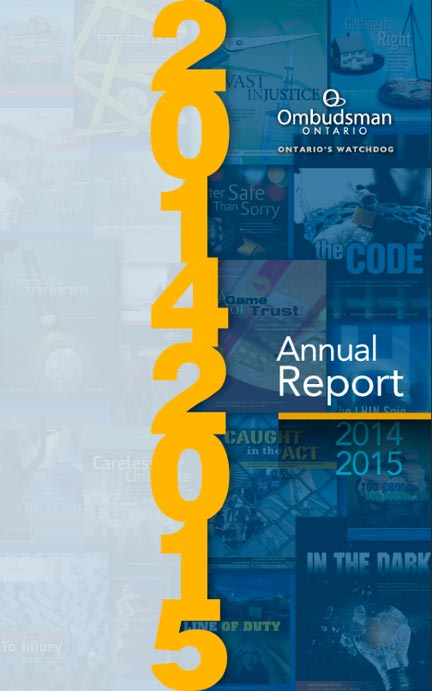
Ontario Ombudsman Andre Marin’s annual report cites “recurring concerns” around the way the Ministry of the Attorney General’s Office of Public Guardian and Trustee treats its vulnerable clients.
 Marin’s report says his office received 142 complaints about poor customer service and communication from the office, which manages the financial affairs of people who don’t have the capacity to do so themselves or have anyone else who is authorized to act on their behalf.
Marin’s report says his office received 142 complaints about poor customer service and communication from the office, which manages the financial affairs of people who don’t have the capacity to do so themselves or have anyone else who is authorized to act on their behalf.
“For example, a long-time OPGT client received a payment of almost $33,700 from an insurance company, as reimbursement for 20 years of underpayments. Not only did the OPGT not inform her about the money, it withdrew $15,500 from her account as compensation for being her financial guardian for 13 years,” says the report released this week.
“The OPGT is able to collect payment for guardianship if clients are able to pay. However, it can defer payment if a client is unable to pay — a fact that it did not advertise. The woman had repeatedly asked the OPGT for information about her finances and did not receive adequate information about the additional funds or the deferred compensation until our office intervened,” it says.
At ARCH Disability Law Centre, executive director Robert Lattanzio says the complaints included in the report are all too familiar. A lot of the clinic’s work around capacity comes from clients who have difficulty accessing services at OPGT, Lattanzio says.
“As I read through the report by the ombudsman, I think our experiences are quite in line. We’ve actually also engaged the ombudsman on some files where we felt we were getting nowhere,” he adds.
At times, the problem is that information is not communicated in an accessible format to clients, says Lattanzio,
“That’s a serious issue we find for a lot of our clients.”
Other times, people have simply been unable to get through to a representative at the OPGT and, as a result, defaulted on payments in their day-to-day lives, Lattanzio adds.
“At the heart of this is something so fundamental — it really is about a person’s autonomy,” he says.
“When someone is under the OPGT, they’ve basically been removed from something we all take for granted. We’re talking about a government body managing property, managing finances on behalf of someone, so we can imagine in our own lives if we don’t have control over that.”
According to Marin’s report, although complaints about the OPGT have dropped by 21 per cent from last year, the kind of concerns complained of has remained the same.
“We have also raised concerns about repeated cases where the OPGT has failed to take appropriate action on behalf of its clients to obtain benefits from other government programs,” says the report. “In one case, it did not submit the necessary transportation allowance forms to the Ontario Disability Support Program (ODSP), causing a woman to lose out on that allowance for 14 months. After Ombudsman staff looked into this, the OPGT agreed to reimburse her $1,799.”
The Ministry of Attorney General did not responded to a request for comments on the report by posting time.
Lattanzio says his impression is there aren’t enough representatives at the OPGT to adequately serve the volume of clients.
Marin’s report also cited other justice-related concerns. In 2014-15, his office received 3,904 complaints about correctional facilities, a slight increase from last year’s 3,839.
The Toronto South Detention Centre, a “superjail” that opened last year, was the subject of 422 complaints, the report says. Those complaints included concerns about “inadequate health care and sick inmates being housed in segregation cells while all four of the facility’s medical units stood empty.”
“In two especially serious cases, we intervened to ensure that inmates who had undergone major surgery could get to an infirmary to receive proper care. The inmates were in severe pain and had been left in segregation cells without adequate medical services,” according to the report.
The ombudsman’s office also saw a sharp increase in complaints regarding segregation placements. It says it found cases where inmates were kept in segregation for months at the time without the benefit of requisite periodic reviews. The report says in the past year, at least three segregated Ontario inmates are believed to have taken their own lives.